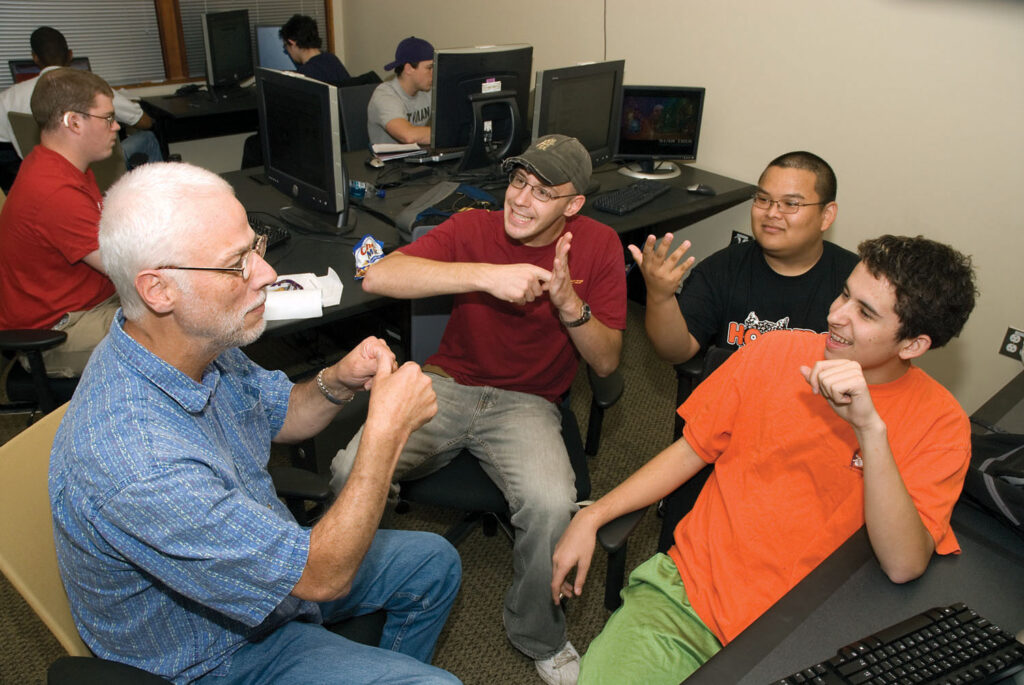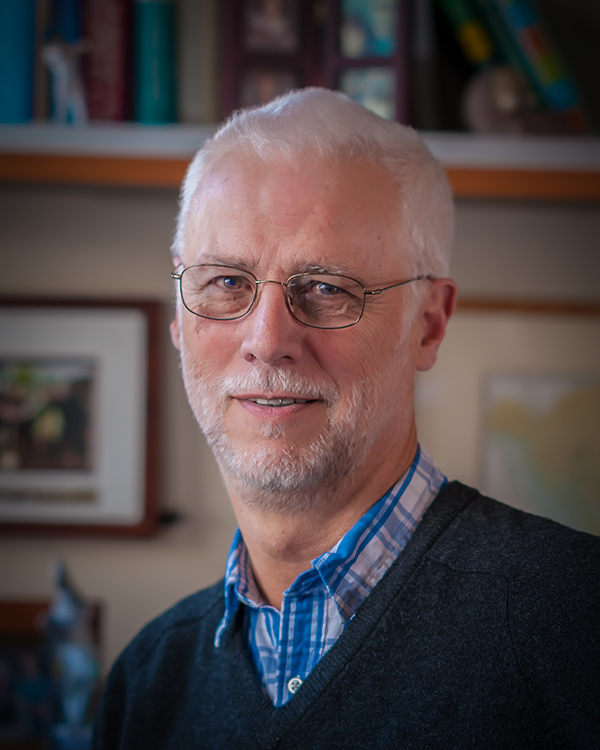Allen School professor emeritus Richard Ladner has been elected a Fellow of the American Association for the Advancement of Science (AAAS) for his “distinguished contributions to the inclusion of persons with disabilities in the computing fields.” One of 26 leading scientists in the organization’s Information, Computing & Communications section to attain the rank of Fellow this year, Ladner has devoted the past two decades to research and advocacy aimed at making computing education and careers more accessible while designing technologies that empower all users.
A mathematician by training, Ladner helped establish the University of Washington’s theoretical computer science group shortly after joining the faculty in the early 1970’s. At the time, Ladner’s interest in disability issues was personal, having been raised by two parents who were deaf. Later, after he completed an American Sign Language course at a local community college, Ladner began doing volunteer work with people who were deaf and blind as well as writing about accessibility issues. Having worked on several accessibility projects in the 1980s and 1990s, his first full-time foray into accessible technology development — an experience that would alter the course of his career in terms of both research and advocacy — would not come until 2002.
That year, Ladner met Sangyun Hahn, a graduate student who was blind. Hahn related to his new advisor his frustration at being unable to easily access certain content in his textbooks, such as mathematical formulas and diagrams. Their discussions led to the launch of the Tactile Graphics project to automate the conversion of textbook figures into an accessible format. A series of accessibility projects followed, including MobileASL, a collaboration between Ladner and UW Electrical & Computer Engineering professor Eve Riskin to enable people to communicate using American Sign Language via a mobile phone; WebAnywhere, a non-visual platform enabling people who are blind to navigate the web using any browser, on any device, with Jeffrey Bigham (Ph.D., ‘09); Perkinput, a Braille-based text entry system for touchscreen devices, with Shiri Azenkot (Ph.D., ‘14) and iSchool professor Jacob Wobbrock; and Blocks4All, an accessible, touchscreen-based blocks environment for children who are blind to learn programming, with Lauren Milne (Ph.D., ‘18).
As a student with a disability, Hahn was a relative rarity in computer science graduate programs at the time he and Ladner met. When the latter turned his attention full-time from exploring the theoretical underpinnings of computing to making computing more accessible to all users, he recognized that one of the obstacles was the lack of pathways for more people with disabilities to pursue computer science and bring their perspectives to the development of new technologies. This led him to partner with Sheryl Burgstahler, director of UW’s DO-IT Center, to establish the Alliance for Access to Computing Careers, or AccessComputing, in 2006 with support from the National Science Foundation’s Broadening Participation in Computing program. AccessComputing helps high school, undergraduate and graduate students to build skills and connections with mentors and professional opportunities in the computing fields. So far, the program has directly served more than 2,400 students with disabilities through a range of activities, from academies and workshops to research and work-based internships.
Ladner subsequently teamed up with Andreas Stefik at the University of Nevada, Las Vegas to launch AccessCSforAll, an initiative aimed at providing accessible curriculum and resources to engage students with disabilities in K-12 computer science education. That work led Code.org and the Computer Science Teachers Association to name Ladner, Stefik and the Quorum programming team 2018 Computer Science Champions. A year later, Ladner and Stefik were again recognized — this time alongside collaborators William Allee and Sean Mealin — with a Best Paper Award from the Association for Computing Machinery’s Special Interest Group in Computer Science Education at the SIGCSE 2019 conference. In the winning paper, “Computer Science Principles for Teachers of Blind and Visually Impaired Students,” the team presented the results of its partnership with Code.org to review and revamp the Advanced Placement CSP curriculum and tools for accessibility.

In 2020, the National Science Board recognized Ladner with its Public Service Award for his exemplary science communication and diversity advocacy — the latest in a long line of previous accolades for his leadership on accessible technology and education that includes the Strache Leadership Award from the Center on Disabilities at University of California, Northridge, the Award for Outstanding Contributions to Computing and Accessibility from the ACM Special Interest Group on Accessible Computing (SIGACCESS), the Richard A. Tapia Achievement Award for Scientific Scholarship, Civic Science and Diversifying Computing from the Center for Minorities and People with Disabilities in Information Technology (CMD-IT), and more. Along the way, Ladner also earned the 2019 Harrold and Notkin Research and Graduate Mentoring Award — named in part for the late David Notkin, former chair of what was then known as the UW Department of Computer Science & Engineering — from the National Center for Women and Information Technology (NCWIT) for his long-standing efforts to advance gender diversity in computing.
Even after he officially attained emeritus status at the Allen School in 2017, Ladner remained active in research and mentoring students in addition to advocacy and program leadership. Over the course of his career, he has supervised or co-supervised 30 Ph.D. students and more than 100 undergraduate researchers — many of whom sought Ladner out for his focus on accessibility before that line of research entered the mainstream. Some of those same students later established the Richard E. Ladner Endowed Professorship, currently held by his faculty colleague Jennifer Mankoff, and the Richard Ladner Endowed Fund for Graduate Student Support in his honor.
Ladner also continues to build on his legacy of advocacy for engaging people with disabilities in technology development. The same year he was recognized for making the K-12 computer science curriculum more accessible, he helped establish the UW’s Center for Research and Education on Accessible Technology and Experiences (CREATE) alongside eight colleagues from multiple UW departments with an inaugural investment from Microsoft. Under the slogan “making technology accessible and making the world accessible through technology,” CREATE supports transformational, multidisciplinary research that will translate into real-world impact while building expertise in accessible technologies and increasing representation in the field for people with disabilities.
“Richard is truly a pioneer in the field of accessible computing,” said professor Magdalena Balazinska, director of the Allen School. “He understood the importance of fully including people with disabilities long before the rest of the field recognized this challenge and he continues to innovate today. He’s an inspiration to all of us.”
Ladner was previously elected a Fellow of the ACM and of the IEEE. He is one of four UW faculty members recognized in the 2021 class of AAAS Fellows, including Emily Carrington, who was honored in the Biological Sciences, and Julia A. Kovacs and Stefan Stoll, who were both honored in Chemistry. Founded in 1848, AAAS is the world’s largest general scientific society.
Learn more about the newly elected AAAS Fellows here.
Congratulations, Richard!


